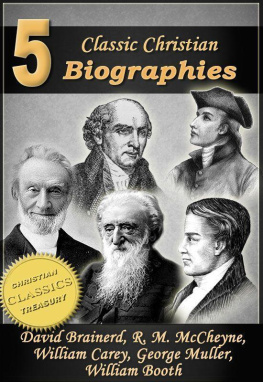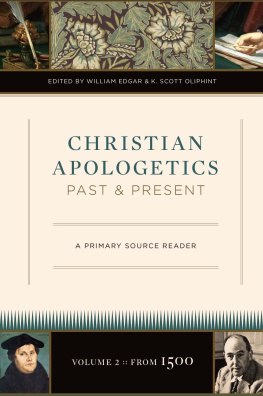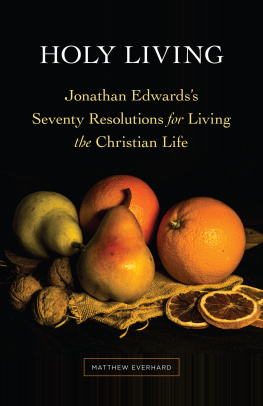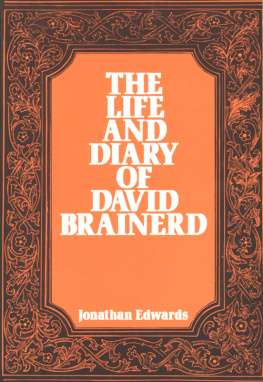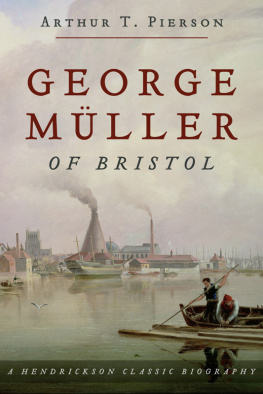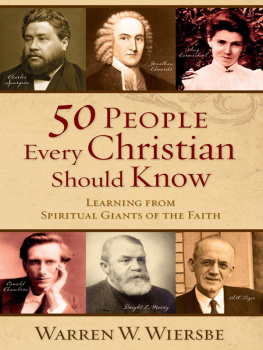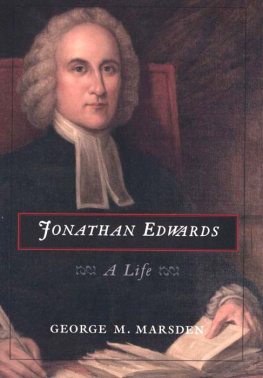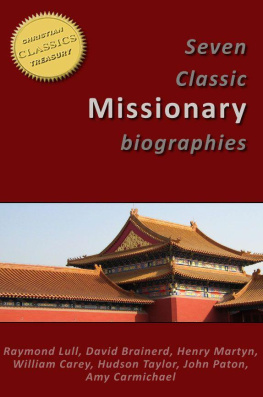From the Editor
The following collection includes the full text of each volume, as originally published, of:
The Life and Diary of David Brainerd by Jonathan Edwards The Biography of Robert Murray McCheyne by Andrew Bonar The Life of William Carey by George Smith George Muller of Bristol by A. T. Pierson The Authoritative Life of General William Booth by G. S. Railton
If you have been blessed by this volume, you may also be interested in some of our other Christian Classics Treasury collections:
Missions Classics:
- Amy Carmichael 7-in-1 (If, Things as They Are, Overweights of Joy, Lotus Buds, Walker of Tinnevelly, Ponnamal, Continuation of a Story)
- Samuel Zwemer 7-in-1 (Arabia Cradle of Islam, Animism in Islam, Raymond Lull, Muslim Christ, Muslim Doctrine of God)
- Classic Missions Texts ( Murray, Allen, Carey, Zwemer )
- 3 Missionary Classics, Vol (Amy Carmichael, Hudson Taylor, John Paton)
- 3 Missionary Classics, Vol ( Lull, Brainerd, Carey )
- David Livingstone Collection (5-in-1)
Classic Biographies:
- Biography of John Wesley 4-in-1
- 10 Early Christian Saints
- The Top 5 Christian Classic Autobiographies (Augustine, Bunyan, Guyon, Finney, Muller)
- Five Christian Classic Biographies (Brainerd, McCheyne, Muller, Carey, Booth)
Classic Collections:
- The Top 7 Prayer Classics
- The Top 7 Classics on Holiness
- The Top 7 Catholic Classics
- The Top 7 Rules & Exercises of the Christian Faith
- The Top 5 Classics on the Holy Spirit
- The Top 5 Christian Classics on Power
- The Top 5 Classics on Revival
Early C hristian Classics:
- The Didache (Teaching of the 12 Apostles)
- Sketches of Jewish Social Life ( Edersheim )
- The Temple-Its Ministry and Service ( Edersheim )
Preachers and Revivalists:
- Charles Spurgeon: 40 sermons on Prayer
- Charles Spurgeon: Lectures to My Students
- The George Muller Collection
- The Revival Writings of Jonathan Edwards (7-in-1)
- The Works of Charles Finney
- The Works of D. L. Moody
- The Works of R. A. Torrey
- The Works of William Booth
- The Works of Jeanne Guyon
- The Azusa Street Papers
1. THE LIFE AND DIARY OF DAVID BRAINERD WITH NOTES AND REFLECTIONS (1749)
BY
The Rev. JONATHAN EDWARDS
Preface
THERE ARE TWO WAYS of representing and recommending true religion and virtue to the world; the one, by doctrine and precept; the other, by instance and example; both are abundantly used in the Holy Scriptures . Not only are the grounds, nature, design, and importance of religion clearly exhibited in the doctrine of scripture its exercise and practice plainly delineated, and abundantly enforced, in its commands and counsels but there we have many excellent examples of religion, in its power and practice, set before us, in the histories both of the Old and New Testament.
JESUS CHRIST, the great Prophet of God, when he came to be the light of the world to teach and enforce true religion, in a greater degree than ever had been before made use of both these methods. In his doctrine, he not only declared the mind and will of God the nature and properties of that virtue which becomes creatures of our make and in our circumstances more clearly and fully than ever it had been before; and more powerfully enforced it by what he declared of the obligations and inducements to holiness; but he also in his own practice gave a most perfect example of the virtue he taught. He exhibited to the world such an illustrious pattern of humility, divine love, discreet zeal, self-denial, obedience, patience, resignation, fortitude, meekness, forgiveness, compassion, benevolence, and universal holiness, as neither men nor angels ever saw before.
God also in his providence has been wont to make use of both these methods to hold forth light to mankind, and inducements to their duty, in all ages. He has from time to time raised up eminent teachers , to exhibit and bear testimony to the truth by their doctrine, and to oppose the errors, darkness, and wickedness of the world; and he has also raised up some eminent persons who have set bright examples of that religion which is taught and prescribed in the word of God; whose examples have, in the course of divine providence, been set forth to public view. These have a great tendency both to engage the attention of men to the doctrine and rules taught, and also to confirm and enforce them; especially when these bright examples have been exhibited in the same persons who have been eminent teachers . Hereby the world has had opportunity to see a confirmation of the truth, efficacy, and amiableness of the religion taught, in the practice of the same persons who have most clearly and forcibly taught it; and above all, when these bright examples have been set by eminent teachers, in a variety of unusual circumstances of remarkable trial ; and when God has withal remarkably distinguished them with wonderful success of their instructions and labours.
Such an instance we have in the excellent person , whose life is published in the following pages. His example is attended with a great variety of circumstances tending to engage the attention of religious people, especially in these parts of the world. He was one of distinguished natural abilities; as all are sensible, who had acquaintance with him. As a minister of the gospel, he was called to unusual services in that work; and his ministry was attended with very remarkable and unusual events. His course of religion began before the late times of extraordinary religious commotion; yet he was not an idle spectator, but had a near concern in many things that passed at that time. He had a very extensive acquaintance with those who have been the subjects of the late religious operations, in places far distant, in people of different nations, education, manners, and customs. He had a peculiar opportunity of acquaintance with the false appearances and counterfeits of religion; was the instrument of a most remarkable awakening, a wonderful and abiding alteration and moral transformation of subjects who peculiarly render the change rare and astonishing.
In the following account, the reader will have an opportunity to see, not only what were the external circumstances and remarkable incidents of the life of this person, and how he spent his time from day to day, as to his external behaviour; but also what passed in his own heart . Here he will see the wonderful change he experienced in his mind and disposition, the manner in which that change was brought to pass, how it continued, what were its consequences in his inward frames, thoughts, affections, and secret exercises, through many vicissitudes and trials, for more than eight years.
He will also see, how all ended at last, in his sentiments, frame, and behaviour, during a long season of the gradual and sensible approach of death, under a lingering illness; and what were the effects of his religion in dying circumstances, or in the last stages of his illness. The account being written, the reader may have opportunity at his leisure to compare the various parts of the story, and deliberately to view and weigh the whole, and consider how far what is related is agreeable to the dictates of right reason and the holy word of God.
I am far from supposing, that Mr. Brainerds inward exercises and experiences, or his external conduct, were free from all imperfections. The example of Jesus Christ is the only example that ever existed in human nature as altogether perfect; which therefore is a rule to try all other examples by; and the dispositions, frames, and practices of others must be commended and followed no further, than they were followers of Christ.
There is one thing in Mr. Brainerd, easily discernible by the following account of his life, which may be called an imperfection in him, which though not properly an imperfection of a moral nature, yet may possibly be made an objection against the extraordinary appearances of religion and devotion in him, by such as seek for objections against every thing that can be produced in favour of true vital religion; and that is, that he was, by his constitution and natural temper, so prone to melancholy and dejection of spirit. There are some who think that all serious strict religion is a melancholy thing, and that what is called Christian experience, is little else besides melancholy vapours disturbing the brain, and exciting enthusiastic imaginations. But that Mr. Brainerds temper or constitution inclined him to despondency, is no just ground to suspect his extraordinary devotion to be only the fruit of a warm imagination. I doubt not but that all who have well observed mankind, will readily grant, that not all who by their natural constitution or temper are most disposed to dejection , are the most susceptive of lively and strong impressions on their imagination, or the most subject to those vehement affections, which are the fruits of such impressions. But they must well know, that many who are of a very happy and sanguine natural temper are vastly more so; and if their affections are turned into a religious channel, are much more exposed to enthusiasm , than many of the former. As to Mr. Brainerd in particular, notwithstanding his inclination to despondency, he was evidently one of those who usually are the furthest from a teeming imagination; being of a penetrating genius, of clear thought, of close reasoning, and a very exact judgment; as all know, who knew him. As he had a great insight into human nature, and was very discerning and judicious in general; so he excelled in his judgment and knowledge in divinity, but especially in things appertaining to inward experimental religion. He most accurately distinguished between real, solid piety, and enthusiasm; between those affections that are rational and scriptural having their foundation in light and judgment and those that are founded in whimsical conceits, strong impressions on the imagination, and vehement emotions of the animal spirits. He was exceedingly sensible of mens exposedness to these things; how much they had prevailed, and what multitudes had been deceived by them; of their pernicious consequences, and the fearful mischief they had done in the Christian world. He greatly abhorred such a religion, and was abundant in bearing testimony against it, living and dying; and was quick to discern when any thing of that nature arose, though in its first buddings, and appearing under the most fair and plausible disguises. He had a talent for describing the various workings of this imaginary , enthusiastic religion evincing its falseness and vanity, and demonstrating the great difference between this and true spiritual devotion which I scarcely ever knew equalled in any person.
Next page
